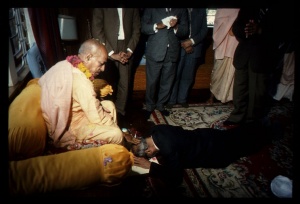SB 6.17.13: Difference between revisions
m (1 revision(s)) |
(Vanibot #0054 edit - transform synonyms into clickable links, which search similar occurrences) |
||
| (One intermediate revision by one other user not shown) | |||
| Line 1: | Line 1: | ||
{{info | {{info | ||
|speaker=Goddess | |speaker=Goddess Pārvatī, wife of Lord Śiva | ||
|listener=King Citraketu | |listener=King Citraketu | ||
}} | }} | ||
[[Category:Srimad-Bhagavatam - Canto 06 Chapter 17]] | |||
[[Category:Bhagavatam Verses Spoken by Parvati, wife of Lord Siva - Vanisource|061713]] | |||
<div style="float:left">'''[[Srimad-Bhagavatam]] - [[SB 6|Sixth Canto]] - [[SB 6.17: Mother Parvati Curses Citraketu|Chapter 17: Mother Pārvatī Curses Citraketu]]'''</div> | |||
<div style="float:right">[[File:Go-previous.png|link=SB 6.17.12]] '''[[SB 6.17.12]] - [[SB 6.17.14]]''' [[File:Go-next.png|link=SB 6.17.14]]</div> | |||
{{RandomImage}} | |||
==== TEXT 13 ==== | ==== TEXT 13 ==== | ||
<div class="verse"> | |||
<div | :eṣām anudhyeya-padābja-yugmaṁ | ||
eṣām anudhyeya-padābja-yugmaṁ | :jagad-guruṁ maṅgala-maṅgalaṁ svayam | ||
jagad-guruṁ maṅgala-maṅgalaṁ svayam | :yaḥ kṣatra-bandhuḥ paribhūya sūrīn | ||
yaḥ kṣatra-bandhuḥ paribhūya sūrīn | :praśāsti dhṛṣṭas tad ayaṁ hi daṇḍyaḥ | ||
praśāsti dhṛṣṭas tad ayaṁ hi daṇḍyaḥ | |||
</div> | </div> | ||
| Line 17: | Line 22: | ||
==== SYNONYMS ==== | ==== SYNONYMS ==== | ||
<div class="synonyms"> | |||
<div | ''[//vanipedia.org/wiki/Special:VaniSearch?s=eṣām&tab=syno_o&ds=1 eṣām]'' — of all these (exalted personalities); ''[//vanipedia.org/wiki/Special:VaniSearch?s=anudhyeya&tab=syno_o&ds=1 anudhyeya]'' — to be constantly meditated upon; ''[//vanipedia.org/wiki/Special:VaniSearch?s=pada&tab=syno_o&ds=1 pada]-[//vanipedia.org/wiki/Special:VaniSearch?s=abja&tab=syno_o&ds=1 abja]-[//vanipedia.org/wiki/Special:VaniSearch?s=yugmam&tab=syno_o&ds=1 yugmam]'' — whose two lotus feet; ''[//vanipedia.org/wiki/Special:VaniSearch?s=jagat&tab=syno_o&ds=1 jagat]-[//vanipedia.org/wiki/Special:VaniSearch?s=gurum&tab=syno_o&ds=1 gurum]'' — the spiritual master of the whole world; ''[//vanipedia.org/wiki/Special:VaniSearch?s=maṅgala&tab=syno_o&ds=1 maṅgala]-[//vanipedia.org/wiki/Special:VaniSearch?s=maṅgalam&tab=syno_o&ds=1 maṅgalam]'' — personification of the topmost religious principle; ''[//vanipedia.org/wiki/Special:VaniSearch?s=svayam&tab=syno_o&ds=1 svayam]'' — himself; ''[//vanipedia.org/wiki/Special:VaniSearch?s=yaḥ&tab=syno_o&ds=1 yaḥ]'' — he who; ''[//vanipedia.org/wiki/Special:VaniSearch?s=kṣatra&tab=syno_o&ds=1 kṣatra]-[//vanipedia.org/wiki/Special:VaniSearch?s=bandhuḥ&tab=syno_o&ds=1 bandhuḥ]'' — the lowest of the ''kṣatriyas''; ''[//vanipedia.org/wiki/Special:VaniSearch?s=paribhūya&tab=syno_o&ds=1 paribhūya]'' — overriding; ''[//vanipedia.org/wiki/Special:VaniSearch?s=sūrīn&tab=syno_o&ds=1 sūrīn]'' — the demigods (like Brahmā and the others); ''[//vanipedia.org/wiki/Special:VaniSearch?s=praśāsti&tab=syno_o&ds=1 praśāsti]'' — chastises; ''[//vanipedia.org/wiki/Special:VaniSearch?s=dhṛṣṭaḥ&tab=syno_o&ds=1 dhṛṣṭaḥ]'' — impudent; ''[//vanipedia.org/wiki/Special:VaniSearch?s=tat&tab=syno_o&ds=1 tat]'' — therefore; ''[//vanipedia.org/wiki/Special:VaniSearch?s=ayam&tab=syno_o&ds=1 ayam]'' — this person; ''[//vanipedia.org/wiki/Special:VaniSearch?s=hi&tab=syno_o&ds=1 hi]'' — indeed; ''[//vanipedia.org/wiki/Special:VaniSearch?s=daṇḍyaḥ&tab=syno_o&ds=1 daṇḍyaḥ]'' — to be punished. | ||
</div> | </div> | ||
| Line 25: | Line 29: | ||
==== TRANSLATION ==== | ==== TRANSLATION ==== | ||
<div class="translation"> | |||
<div | |||
This Citraketu is the lowest of kṣatriyas, for he has impudently overridden Brahmā and the other demigods by insulting Lord Śiva, upon whose lotus feet they always meditate. Lord Śiva is personified religion and the spiritual master of the entire world, and therefore Citraketu must be punished. | This Citraketu is the lowest of kṣatriyas, for he has impudently overridden Brahmā and the other demigods by insulting Lord Śiva, upon whose lotus feet they always meditate. Lord Śiva is personified religion and the spiritual master of the entire world, and therefore Citraketu must be punished. | ||
</div> | </div> | ||
| Line 32: | Line 35: | ||
==== PURPORT ==== | ==== PURPORT ==== | ||
<div class="purport"> | |||
All the members of the assembly were exalted ''brāhmaṇas'' and self-realized souls, but they did not say anything about the conduct of Lord Śiva, who was embracing the goddess Pārvatī on his lap. Citraketu nonetheless criticized Lord Śiva, and therefore the opinion of Pārvatī was that he should be punished. | |||
</div> | |||
<div | <div style="float:right; clear:both;">[[File:Go-previous.png|link=SB 6.17.12]] '''[[SB 6.17.12]] - [[SB 6.17.14]]''' [[File:Go-next.png|link=SB 6.17.14]]</div> | ||
__NOTOC__ | |||
</div> | __NOEDITSECTION__ | ||
__NOTOC__ | |||
Latest revision as of 22:33, 18 February 2024

A.C. Bhaktivedanta Swami Prabhupada
TEXT 13
- eṣām anudhyeya-padābja-yugmaṁ
- jagad-guruṁ maṅgala-maṅgalaṁ svayam
- yaḥ kṣatra-bandhuḥ paribhūya sūrīn
- praśāsti dhṛṣṭas tad ayaṁ hi daṇḍyaḥ
SYNONYMS
eṣām — of all these (exalted personalities); anudhyeya — to be constantly meditated upon; pada-abja-yugmam — whose two lotus feet; jagat-gurum — the spiritual master of the whole world; maṅgala-maṅgalam — personification of the topmost religious principle; svayam — himself; yaḥ — he who; kṣatra-bandhuḥ — the lowest of the kṣatriyas; paribhūya — overriding; sūrīn — the demigods (like Brahmā and the others); praśāsti — chastises; dhṛṣṭaḥ — impudent; tat — therefore; ayam — this person; hi — indeed; daṇḍyaḥ — to be punished.
TRANSLATION
This Citraketu is the lowest of kṣatriyas, for he has impudently overridden Brahmā and the other demigods by insulting Lord Śiva, upon whose lotus feet they always meditate. Lord Śiva is personified religion and the spiritual master of the entire world, and therefore Citraketu must be punished.
PURPORT
All the members of the assembly were exalted brāhmaṇas and self-realized souls, but they did not say anything about the conduct of Lord Śiva, who was embracing the goddess Pārvatī on his lap. Citraketu nonetheless criticized Lord Śiva, and therefore the opinion of Pārvatī was that he should be punished.